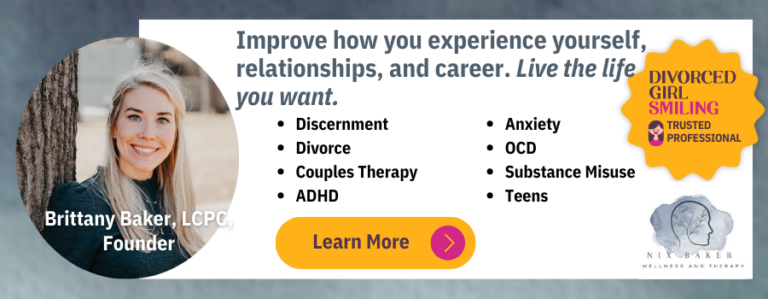There are so many reasons people get divorced, but they all boil down to the same concept: one or both are unhappy in the marriage. And, unhappiness can lead to depression. In this article, I want to address depression and divorce, as it is often hard to know which came first. In other words, is your divorce the result of your depression? Or, is your depression being caused by your divorce?
Depression versus sadness versus grief
Though we use the term ‘Depressed’ often, not all feelings of sadness or lack of motivation or joy qualify as clinical depression. Clinical depression (or diagnosable depression) is a set of symptoms that often happen together for more than two weeks and significantly impact your personal or professional life. Symptoms include:
- Feeling sad, down, or hopeless more days than not
- Feelings of worthlessness, helplessness, hopelessness, excessive guilt
- Increased anger, irritability, or frustration
- Increased crying that is difficult to control
- Loss of interest in things you once enjoyed
- Lacking motivation
- Weight changes (either gaining or losing weight)
- Changes in appetite
- Changes in sleep patterns (insomnia or sleeping more than usual)
- Changes in energy levels (typical feeling fatigued or never rested)
- Difficulty getting out of bed
- Changes in motor behavior (jittery or moving constantly or moving much more slowly than normal, as if moving through mud)
- Difficulty with concentration or focus
- Feeling indecisive or unable to make decisions
- “Brain Fog”
- Difficulty with self-care or basic hygiene (such as decreasing the number of showers taken, wearing dirty clothes often, or not brushing teeth or hair)
- Increased Rumination (An inability to change or shift thoughts about situations or events)
- Increased thoughts of death, dying, or suicide
To be diagnosed as depressed, a person would need to experience at least 5 of these symptoms during a single 2-week period and experience a negative impact on their life as a result of the symptoms.
For many, the experience of sadness or grief can look and feel a lot like depression, especially during divorce. But these emotions and experiences do not necessarily mean you are depressed.
It is normal for one to experience sadness or even to need to work through the grief process after a significant loss of any kind. And Let’s face it; divorce is full of potential losses- loss of a relationship, loss of a home, loss of a pet, loss of an income, loss of time with your kids, loss of family, loss of what you thought your future would look like… The list could go on for a while!
Divorce also creates many changes, and a person can experience grief around both happy and difficult changes. The more modern grief process describes phases that we can move in and out of over time when healing from loss or change (denial, anger, bargaining, depression, and acceptance). Depression is a part of this grief model, but it is not often a place where one remains stuck. To decipher between grief, depression, and sadness, think about the severity of the symptoms, how long they have lasted, and the ongoing impact on life or relationships.
Divorce and depression: Can divorce lead to depression?
Divorce can lead to a depressive episode, even if the divorce was something you wanted. As I pointed out, we go through so many changes and losses emotionally, mentally, physically, and environmentally during and after a divorce. It is only natural to have big emotions when the process is over. Many people experience a significant “letdown” because they no longer live in unrest or crisis. The sudden end to the stress hormones and ongoing turmoil can leave us tired, unmotivated, ruminating, and wondering what to do next.
To understand if you are experiencing something unusual, monitor yourself and your daily functioning. Are you slipping up at work, letting your personal hygiene or self-care go, having difficulty in your relationships with family or friends, lacking motivation, or feeling as if there is not much to distract you from hard thoughts or sadness? If so, you should talk to someone.
A therapist or a psychiatrist can help to evaluate if what you are experiencing is clinical depression and can start to work with you to find relief or turn the symptoms around. If it is challenging to get in with a therapist or psychiatrist quickly, start with your primary care physician. They have the basic knowledge to either help or refer you to resources that can help.
I typically encourage people not to stop with the primary care physician, though, as they are not necessarily experts in mental health but a first-line defense and resource to jump-start your healing journey. If you notice that you are experiencing some of the depression symptoms but still functioning ok, you may be experiencing grief or just adjusting to your new life. Lean into your social support and self-care, and seek professional support to work through these feelings.
Can depression lead to divorce?
Depression can lead to challenges in a relationship and potentially divorce. The symptoms of depression are experienced by the individual and have a “trickle-down” impact on those around us. Depression can make us feel worthless or hopeless and appear more irritable, angry, or distant. These emotions can impact our ability to see the good in different situations, people, or ourselves. Depression can be like wearing dark sunglasses; everything loses its luster and brightness. People can lose motivation in different ways, and the marriage can become less and less of a priority.
If someone doesn’t have the energy to get out of bed, it is unlikely someone will have the energy to put in the work required for a long-term relationship. The behaviors and symptoms associated with depression can create shame, which turns us further inward. As one could imagine, the symptoms of depression create turmoil between two partners. Difficulties I see often between couples with one or both partners struggling with depression include:
- Feeling unloved, uncared for, unheard
- Feeling emotionally disconnected
- Feeling like one partner is hiding something
- Anger issues
- Avoidance of issues in the relationship or other areas of life
- Feeling as if partner is not an active participant in life
- Job or financial insecurity
- Difficulty communicating or managing conflict
- Feeling as if one partner is parenting the other
- Feeling as if one partner does not show up as an active parent
- Alcoholism or substance abuse
These difficulties can lead to the end of the relationship if the depression is not acknowledged and addressed appropriately. It is challenging to decide if depression caused a divorce. Hindsight can be valuable, especially when one has made it to the other side of a depressive episode. Symptoms can be reviewed and evaluated in conjunction with the difficulties in the relationship to form a conclusion.
I definitely feel more than grief and sadness…
If you recognize that what you are going through is more than sadness, grief, or adjustment to change, reach out to social support, your primary care provider, a therapist, or a psychiatrist. Don’t wait. Depression can snowball quickly.
I don’t like to “reinvent the wheel,” so I typically recommend leaning into things that brought some relief, rejuvenation, or joy in the past. It can be hard to find joy in the things you once loved when you are stepping into a new phase of life where so many things are different. Find ways to alter these activities so that they work for you. Other behavioral techniques that can create positive change include trying new things, moving your body, connecting with people, journaling, and checking your mindset. These things may not give you joy or change your mood immediately, but it is vital to keep putting one foot in front of the other. Many people dismiss or do not recognize the importance of how we treat ourselves when we are feeling down, grieving, or depressed. Be kind to yourself. You have been through a lot, and that’s ok.

As a seasoned therapist and founder of Nix Baker Wellness and Therapy, I am passionate about building a safe, supportive, individualized, and meaningful experience for clients. I want you to feel seen and understood. Therapy starts with creating a strong relationship, continues with building skills that work for your life and meet your needs, and evolves by integrating your past and present to recognize patterns in your life to create lasting positive change.
I am a Licensed Clinical Social Worker and an integrative therapist with over 10 years of experience. I draw from different modalities to create individualized treatment plans for each client. My expertise includes Cognitive Behavioral Therapy (CBT), Dialectical Behavior Therapy (DBT), Motivational Interviewing (MI), Emotion Focus Therapy (EFT), Attachment Therapy, Gottman Method, Solution Focused Therapy, Supportive Parenting for Anxious Childhood Emotions (SPACE), Executive Functioning Coaching, and Strength Based Therapy.
I have extensive experience working with diverse groups of people struggling with anxiety, depression, ADHD, traumatic events, life transitions, substance misuse/abuse, parenting issues, and relationship challenges. I attended the University of Texas at Austin as an undergraduate and completed the Master of Social Work Program at the University of Southern California. I received clinical training and practiced at high-quality teaching medical facilities in the Houston Area. I am a board-approved clinical supervisor for budding clinical social workers in Texas and Illinois, and I provide consultation for other clinicians on tough cases in their own practice.





















